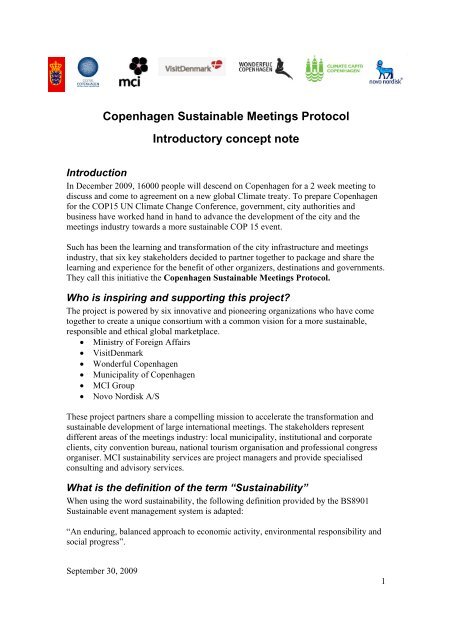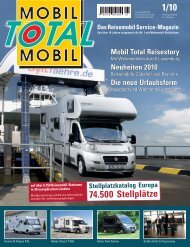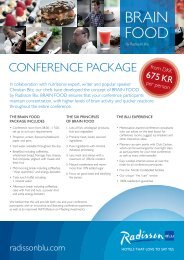Copenhagen Sustainable Meetings Protocol Introductory concept note
Copenhagen Sustainable Meetings Protocol Introductory concept note
Copenhagen Sustainable Meetings Protocol Introductory concept note
Create successful ePaper yourself
Turn your PDF publications into a flip-book with our unique Google optimized e-Paper software.
September 30, 2009<br />
<strong>Copenhagen</strong> <strong>Sustainable</strong> <strong>Meetings</strong> <strong>Protocol</strong><br />
<strong>Introductory</strong> <strong>concept</strong> <strong>note</strong><br />
Introduction<br />
In December 2009, 16000 people will descend on <strong>Copenhagen</strong> for a 2 week meeting to<br />
discuss and come to agreement on a new global Climate treaty. To prepare <strong>Copenhagen</strong><br />
for the COP15 UN Climate Change Conference, government, city authorities and<br />
business have worked hand in hand to advance the development of the city and the<br />
meetings industry towards a more sustainable COP 15 event.<br />
Such has been the learning and transformation of the city infrastructure and meetings<br />
industry, that six key stakeholders decided to partner together to package and share the<br />
learning and experience for the benefit of other organizers, destinations and governments.<br />
They call this initiative the <strong>Copenhagen</strong> <strong>Sustainable</strong> <strong>Meetings</strong> <strong>Protocol</strong>.<br />
Who is inspiring and supporting this project?<br />
The project is powered by six innovative and pioneering organizations who have come<br />
together to create a unique consortium with a common vision for a more sustainable,<br />
responsible and ethical global marketplace.<br />
� Ministry of Foreign Affairs<br />
� VisitDenmark<br />
� Wonderful <strong>Copenhagen</strong><br />
� Municipality of <strong>Copenhagen</strong><br />
� MCI Group<br />
� Novo Nordisk A/S<br />
These project partners share a compelling mission to accelerate the transformation and<br />
sustainable development of large international meetings. The stakeholders represent<br />
different areas of the meetings industry: local municipality, institutional and corporate<br />
clients, city convention bureau, national tourism organisation and professional congress<br />
organiser. MCI sustainability services are project managers and provide specialised<br />
consulting and advisory services.<br />
What is the definition of the term “Sustainability”<br />
When using the word sustainability, the following definition provided by the BS8901<br />
<strong>Sustainable</strong> event management system is adapted:<br />
“An enduring, balanced approach to economic activity, environmental responsibility and<br />
social progress”.<br />
1
What are the objectives of the project?<br />
1. Inspire continuous action and sustainable development of <strong>Copenhagen</strong> and the<br />
Danish <strong>Meetings</strong> Industry<br />
2. Share knowledge and learning from COP15 and the <strong>Copenhagen</strong> Climate<br />
strategy<br />
3. Contribute and influence the meeting practices of large event organisers<br />
(institutional and corporate)<br />
4. Help destinations to accelerate transformation to become more sustainable<br />
host cities<br />
5. Use the protocol to increase adoption of key global sustainability standards<br />
and certifications<br />
Why undertake this project?<br />
The partners believe that large events such as COP15, have the potential to transform<br />
destinations. Large events touch hundreds of industries and thousands of people. Events<br />
are a multiplier for the successful evolution of vitalized communities – they are the most<br />
effective form of communicating and motivating change. Demanding, encouraging and<br />
supporting sustainability within large events catalyzes business to take practical action.<br />
The partners believe that events are part of the solution. The global meetings industry,<br />
with its’ broad reach and expansive network, must evolve to achieve a higher standard for<br />
more effective and efficient business practices that integrate sustainability into day to day<br />
operations and strategic management. The project is meant to shine a light on the path to<br />
get there.<br />
What are the key components of the project?<br />
1. BS8901 Implementation in Denmark: A key component of the initiative is the<br />
introduction of the BS8901 <strong>Sustainable</strong> Event Management System into the<br />
Danish market place. MCI Sustainability Services, in a collaboration with the<br />
leading global BS8901 auditors - <strong>Sustainable</strong> Event Certification (SEC), have<br />
engaged the national standards and certification body, Dansk Standard and Dansk<br />
Certification in an initiative to bring the BS8901 event standard to Denmark.<br />
Danish Standards is translating the BS8901 into Danish and will be supporting its<br />
evolution to an ISO standards. Once trained in it’s administration, Dansk<br />
Certification will provide third party auditing services for organisations who wish<br />
to implement and certify their event planning process with BS8901 in the future.<br />
2. Integrate the BS8901 system into COP15: To improve the overall sustainability<br />
of the COP15 event, the Danish Ministry of Foreign Affairs decided to implement<br />
and integrate the BS8901 <strong>Sustainable</strong> Event Management System into the<br />
organisation of the event. Working with MCI and SEC the ministry has<br />
implemented additions and improvements to policy, process and systems to<br />
increase the social, environmental and economic sustainability of the conference.<br />
September 30, 2009<br />
2
Danish Certification have been tasked to certify the effectiveness and<br />
performance of the Ministry’s event management system.<br />
3. Create and publish the COP15 sustainability case study: As part of the<br />
BS8901 process and the Danish Governments commitment to sustainability, MCI<br />
have been commisioned to create a case study report of the COP15 event. The<br />
report will capture, assess and report on the sustainability actions and<br />
performance of the conference. This includes<br />
a. Sustainability commitment, systems, policies and processes<br />
b. Results achieved<br />
c. Process and systems performance assessment<br />
d. Sustainability impact disclosure and assessment<br />
e. Key learnings, critical success factors and conclusions<br />
4. Create and publish the <strong>Copenhagen</strong> <strong>Sustainable</strong> <strong>Meetings</strong> <strong>Protocol</strong><br />
a. The <strong>Copenhagen</strong> <strong>Sustainable</strong> <strong>Meetings</strong> <strong>Protocol</strong> will be a flexible umbrella<br />
framework that can be used to organize large, complex meetings in a<br />
sustainable way. It integrates local and international sustainability initiatives,<br />
standards, systems and certification programs. The protocol builds on the<br />
efforts done before, and the experiences collected during, Denmark’s hosting<br />
of the UN Climate Change Conference, COP 15, in December 2009.<br />
b. The protocol is a guide for good leadership and active engagement of key<br />
stakeholders in large meetings. It identifies innovative and synergetic<br />
strategies that catalyze sustainable development - for the benefit of organizers,<br />
delegates and host communities.<br />
5. Launch an engagement and learning program<br />
a. The project partners will be taking the protocol “on the road”, engaging with<br />
meeting industry stakeholders to share the initiatives learnings and insights.<br />
By entering into collaborative dialog and new partnerships, they intend to<br />
work towards a goal of accelerate the transformation of the meetings industry.<br />
Collaboration, Partnership and Synergy<br />
The project aligns and reinforces key local and international sustainability initiatives. It<br />
delivers enhanced results through mutually beneficial collaboration. It integrates BS8901<br />
as a sustainability management system with sustainability principles such as the UN<br />
Global Compact. The project partners seek to inspire sustainable practices and to attract<br />
better events to host locations. It underscores the importance of certification programs,<br />
meetings industry initiatives, government policy and corporate engagement and, in so<br />
doing, outlines the need for a sustainable local infrastructure. The <strong>Protocol</strong> is a gift to the<br />
industry with the intention that it will improve over time as technological innovations and<br />
best practices are shared.<br />
September 30, 2009<br />
3
When will the project result be ready?<br />
The draft protocol <strong>concept</strong> will be ready for EIBTM and COP15. The COP15 Case Study<br />
report will be ready by the end of February, 2009.<br />
Who should be contacted for more information?<br />
� Key Contacts<br />
o Lars Blicher-Hansen, VisitDenmark, lbh@visitdenmark.com, tel. +45<br />
32889920<br />
o Jan-Christoph Napierski, Udenrigsministeriet, jannap@um.dk, tel. +45<br />
33920654<br />
� Project Consultants<br />
o Guy Bigwood, Group Sustainability Director, Guy.bigwood@mcigroup.com,<br />
tel. +34 669 76 26 34<br />
� Project Partners<br />
o Lotte Kjærgaard, Center for Miljø, Københavns Kommune,<br />
lokjae@tmf.kk.dk, tel. +45 33665982<br />
o Signe Gaarde, Økonomiforvaltningen, Københavns Kommune,<br />
sig@okf.kk.dk, tel. +45 33662283<br />
o Lise-Lotte Skovdal, Wonderful <strong>Copenhagen</strong>, lls@woco.dk, tel. +45<br />
33557424<br />
o Lotte Wagner, MCI <strong>Copenhagen</strong>, lotte@nhg.dk, tel. +45 70222130<br />
o Heather Palen, Novo Nordisk A/S, hpal@novonordisk.com, tel.+45 4444<br />
8888.<br />
September 30, 2009<br />
4







